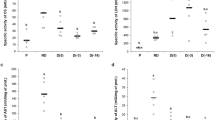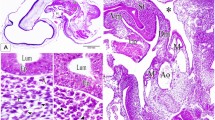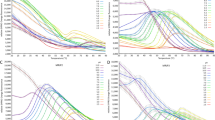Abstract
THE rate of termination of diapause in eggs of Acheta commodus (Walk) has a negative temperature coefficient within the range −16.5 to +5° C.1. It has been reported by Jacobsen and Christensen2 that the initial stages of denaturation of β-lactoglobulin by urea has a negative temperature coefficient. Accordingly, experiments have been carried out with certain denaturants, primarily urea, for evidence of any effect on diapause. The attempt was made to incorporate the chemicals into the eggs by making use of the capacity of Orthopteran eggs to take up water during their development. In Acheta the uptake of water occurs slightly later than the onset of diapause3.
This is a preview of subscription content, access via your institution
Access options
Subscribe to this journal
Receive 51 print issues and online access
$199.00 per year
only $3.90 per issue
Buy this article
- Purchase on Springer Link
- Instant access to full article PDF
Prices may be subject to local taxes which are calculated during checkout
Similar content being viewed by others
References
Hogan, T. W., Aust. J. Biol. Sci., 13, 527 (1960).
Jacobsen, C. F., and Christensen, L. K., Nature, 161, 30 (1948).
Hogan, T. W., Aust. J. Biol. Sci. 13, 14 (1960).
Jensen, E. V., Science, 130, 1319 (1959).
Klotz, I. M., Science, 128, 815 (1958).
Author information
Authors and Affiliations
Rights and permissions
About this article
Cite this article
HOGAN, T. Termination of Diapause in Acheta by Urea. Nature 190, 367–368 (1961). https://doi.org/10.1038/190367b0
Issue Date:
DOI: https://doi.org/10.1038/190367b0
Comments
By submitting a comment you agree to abide by our Terms and Community Guidelines. If you find something abusive or that does not comply with our terms or guidelines please flag it as inappropriate.



